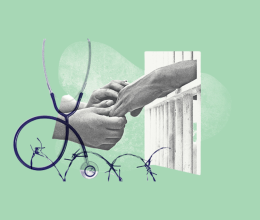
According to the Salt Lake Tribune this week, Salt Lake County plans to renew its call for the Utah Legislature to approve an expansion of Medicaid access and coverage in Utah. Why is this a topic for discussion in a blog post about criminal justice reform?
Because Medicaid expansion, as conceptualized in the Affordable Care Act (ACA, also affectionately known as Obamacare), could have a bigger impact than just about any other policy change when it comes to reducing U.S. prison and jail populations. It is estimated that nearly 90% of incarcerated individuals nationwide have no health insurance - most are low-income single men...who are not currently covered by Medicaid...and many of whom are suffering with severe mental illness, or who have committed crimes related to substance abuse disorders.
Not familiar with the Medicaid program? Here's a quick primer at Wikipedia. A major point - prior to expansion under the ACA, living in poverty didn't necessarily qualify someone for coverage.
We also highly recommend "Healthcare, Not Handcuffs: Putting the Affordable Care Act to Work for Criminal Justice and Drug Law Reform," a report by the ACLU and the Drug Policy Alliance. It discusses how for decades the U.S. has inappropriately dealt with certain public health issues (i.e. mental illness and susbstance abuse disorders) within the framework of the criminal justice system.
That's why people who are not able to get treatment for persistent and serious mental illness are vastly overrepresented behind bars in our country. So are non-violent drug offenders, many of whom are primarily guilty of having serious and untreated substance abuse problems. If these people had the financial resources to get help for their issues in the first place, they might never come into contact with the criminal justice system.
Any one who pays taxes in this country - and everyone else, for that matter! - should find this incredibly troubling. Because it would cost a LOT less (as well as be more protective of public safety, and, well, just make more sense) to simply treat mental illness and substance abuse disorders as the public health issues they are, rather than...
- Wait for mentally-ill or substance-abusing individuals to commit crimes, possibly endangering themselves or those around them....
- Push them through expensive and time-consuming pre-trial and court processes....
- Sentence them and putting them behind bars in a prison or jail facility....
- and then FINALLY get them treatment for mental illness or susbstance issues - behind bars, at a cost of tens of thousands of tax dollars each year (and that's without even trying to calculate the cost of lost opportunities and destroyed community connections).
Salt Lake County's Behavioral Health Services leaders made this connection between Medicaid expansion and criminal justice costs way before the rest of the state, and has been tirelessly sharing the message since. For good reason, too - more than 40% of the Utahns that would be covered by Medicaid under the ACA expansion live in Salt Lake County. The County says by expanding access to health care, the state - and, by extension, the counties - could save millions of dollars each year by not cycling people with legitimate health problems endlessly through the criminal justice system.
This isn't just an opinion - it's backed by the experiences of other states that have already expanded Medicaid. In Washington State, for example, expansion allowed for more treatment of chemically-dependent, very low-income childless adults, with the following results:
- 21 to 33% lower rearrest rates for three groups receiving substance abuse treatment.
- $5,000 to $10,000 savings for each person treated (savings realized from reduced law enforcement intervention, jail, court and correctional agency costs).
The data shows that ensuring Medicaid coverage upon release from corrections facilities really can reduce recidivism rates. That is, getting people the HEALTH assistance they need when they get out of prison or jail, helps them take accountability for their lives and contribute to their communities.
For those who worry about Medicaid expansion adding to the size and cost of government, consider this: your tax dollars are already paying for problems related to mental illness and substance abuse, sometimes several times over. Instead of dealing with those problems efficiently, however, as public health issues, your tax dollars are being messily and ineffecitvely squandered on a revolving door of incarceration that does little, if anything at all, to tackle the underlying health issues driving recidivism.
Note: information compiled by Jeannie Edens and Pat Fleming at Salt Lake County contributed mightily to this post.





